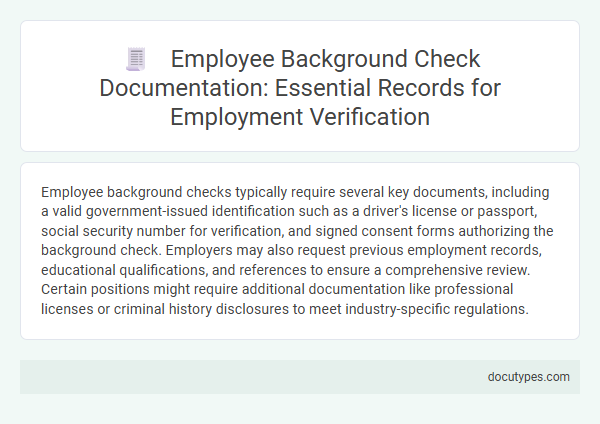Employee background checks typically require several key documents, including a valid government-issued identification such as a driver's license or passport, social security number for verification, and signed consent forms authorizing the background check. Employers may also request previous employment records, educational qualifications, and references to ensure a comprehensive review. Certain positions might require additional documentation like professional licenses or criminal history disclosures to meet industry-specific regulations.
Introduction to Employee Background Check Documentation
Employee background checks are essential for verifying the qualifications and history of potential hires. Proper documentation ensures compliance with legal standards and protects both employers and employees.
- Identification Documents - Valid government-issued IDs confirm the applicant's identity and eligibility to work.
- Employment History Records - Previous job titles and durations verify the candidate's work experience and professional background.
- Criminal Background Reports - Official records help assess any past criminal activity relevant to the job position.
Importance of Background Checks in Employment
Background checks are essential in employment for verifying a candidate's identity, criminal history, and professional qualifications. Key documents required typically include government-issued identification, social security number verification, and previous employment records. Ensuring these checks helps protect your organization from potential risks and enhances overall workplace security.
Key Legal Requirements for Employment Verification
What key legal documents are required for employee background checks during employment verification? Employers must obtain a candidate's consent before conducting background checks to comply with the Fair Credit Reporting Act (FCRA). Essential documents include government-issued identification, Social Security number verification, and employment authorization forms to ensure lawful hiring practices.
Personal Identification Records Needed
Personal identification records are essential for conducting thorough employee background checks. These records commonly include a government-issued ID, such as a driver's license or passport, to verify identity. Providing accurate personal identification ensures the background check process is efficient and reliable for your hiring decisions.
Employment History Verification Documents
Employment history verification is a critical part of employee background checks, ensuring candidates have the experience they claim. Employers often require documents that confirm previous job titles, dates of employment, and job responsibilities.
Commonly requested documents include pay stubs, W-2 forms, tax returns, and official employment verification letters. These papers help validate the candidate's work history and provide insight into their reliability and skills.
Educational Credentials and Certificates
Educational credentials and certificates are essential documents for employee background checks. Employers verify these documents to confirm the authenticity of a candidate's academic qualifications.
Commonly required documents include diplomas, degrees, and professional certifications. Verification of these credentials helps ensure the candidate meets the job's educational requirements and maintains industry standards.
Criminal Record and Background Reports
Employee background checks are essential for verifying the integrity and suitability of potential hires. Criminal record and background reports provide key insights into an individual's history and behavior.
- Criminal Record Check - Confirms any past convictions or legal issues that may impact job performance or trustworthiness.
- Background Reports - Include education verification, employment history, and credit checks to ensure candidate accuracy.
- Consent Form - Required to legally obtain and review an applicant's criminal and background information.
Your compliance with legal requirements regarding these documents safeguards your hiring process.
Reference Checks and Professional Endorsements
Reference checks and professional endorsements are critical components of employee background checks. These documents validate an applicant's work history and professional reputation.
- Reference Letters - Written endorsements from previous employers or colleagues that verify job performance and character.
- Contact Information for References - A list of credible individuals who can provide firsthand accounts of your professional capabilities and conduct.
- Professional Endorsements - Certifications or recommendation letters from industry experts that confirm your skills and achievements.
Maintaining Confidentiality and Data Security
Employee background checks require specific documents to verify identity, employment history, and qualifications. Common documents include government-issued identification, social security numbers, and consent forms.
Maintaining confidentiality and data security during this process is crucial to protect sensitive information. Employers must store documents securely and restrict access to authorized personnel only. Your company's compliance with data protection laws ensures that employee privacy is respected throughout background checks.
Which Documents Are Required for Employee Background Checks? Infographic

